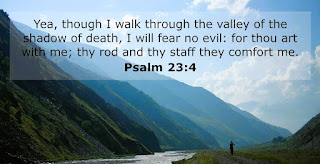So Moses continued to speak these words to all
Israel. And he said to them, “I am 120 years old today. I am no longer able to go
out and come in. The LORD has said to me, ‘You shall not go over this Jordan.’ The
LORD your God himself will go over before you. He will destroy these nations
before you, so that you shall dispossess them, and Joshua will go over at your
head, has the LORD has spoken. And the LORD will do to them as he did to Sihon and
Og, the kings of the Amorites, and to their land, when he destroyed them. And
the LORD will give them over to you, and you shall do to them according to the
whole commandment that I have commanded you. Be strong and courageous. Do not
fear or be in dread of them, for it is the LORD your God who goes with you. He
will not leave you or forsake you.” (Deuteronomy 31:1-6 ESV).
It’s natural to have some fear or apprehension at the beginning of a new experience. When Mary and I moved back to Texas nine years ago, she wanted to learn to be comfortable around firearms. We contacted a wonderful instructor and signed up for an extended training together. I’ve been shooting since I was ten years old. It was not a new experience for me. Mary had never touched a firearm, much less fired it. The instruction was incredible, and her confidence changed enormously. The fear of firearms dissipated quickly, and she became quite proficient with her pistol! And, she found shooting to be fun!
In our reading today Moses informs the
people that he would not be leading them into the land. Joshua would be the one
to lead the people. What a huge task! We couldn’t blame Joshua for at least
having a little fear. But God tells him to be strong and courageous and not to
be afraid or discouraged. And this encouragement is more than a pep talk. This
is God’s promise to Joshua that wherever he goes in the new land that God would
bring them into—and however hard the task before him would be—God would always
be right there with him.
We face difficulties all the time—at
work and school, and with our families and friends. We have many opportunities
to be discouraged and afraid. But God’s promise to us is the same as it was to
Joshua: God will be with us wherever we go. Of course, this does not mean we
forego training and education. However, the unknown can still be very scary. The
key is that God is with us. This is the first step in overcoming fear. Trust in
His presence and power in every experience of life. In fact, you might even
enjoy the experience a great deal!






















